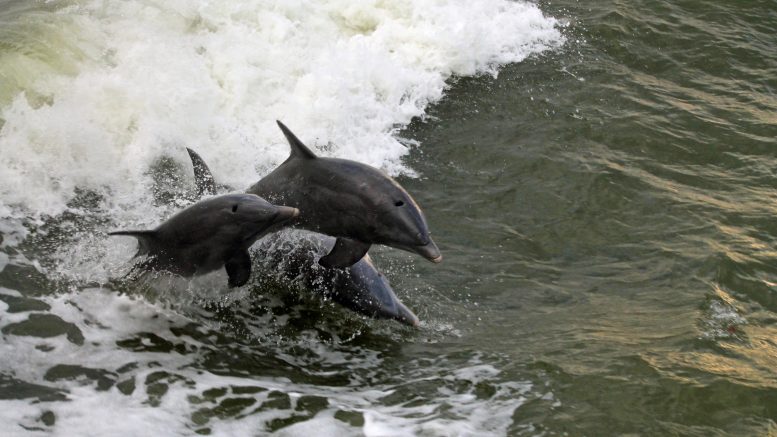Image by Adrienne S., courtesy of Creative Commons
Written by Nicole Zummar/Columnist
University senior Valeria Paz often goes on trips to the Everglades. She heads to Florida Bay and takes off the shore to delve deep into nature. However, her purpose is not necessarily to observe Florida’s natural wonders. She is a student researcher who’s analyzing the effects of the restoration of the Everglades on wildlife.
According to her mentor the Dean at the College of Arts and Sciences, Michael Heithaus, she is taking the lead on a part of Everglades research that has yet to be fully explored.
Paz deals with how the Everglades restoration is affecting the water flow and the predators that inhabit the areas. During the past century, the Everglades was subject to a series of projects that deteriorated the natural habitat for much of Florida’s wildlife. The combination of growing agriculture and canals and levees that were built throughout the national park caused a dramatic change and drainage of many areas of the park.
In the past few years, there has been a collective effort to restore its sustainability. However, while this has helped stop the deterioration of the Everglades, it has also created new problems with its flora and fauna.
Paz has worked with dolphins in the Everglades, given that their high metabolism as mammals give a better insight to the ecology surrounding them. She works on the field and in the lab, studying biopsies samples taken by biologist Jeremy Kiszka whom she also works closely with.
According to Heithaus, Paz has achieved much during the few years of her undergraduate career.
“She has done work that is going to be able to be in a paper that will be in a peer reviewed scientific journal. And that is something we aim for in master’s students,” Heithaus said.
Before working with Heithaus, she had looked through different labs until she became interested in his work. She approached him, seeking an opportunity to work in a project with him and was surprised when he gave her the lead in an important topic of study.
“He has helped [me] out with the writing and putting together part of the research. He set me in the right track and has helped mold my way of thinking,” Paz said.
Depending on the season, she heads out to Florida Bay between two to five times a month, where she and Kiszka take out a boat and observe the dolphins and their behavior and do biopsy samplings. They begin their trips at 4 a.m., the time at which they meet up in order to arrive to the Everglades by 8 a.m., and doesn’t end until sundown.
“I work with Jeremy everyday. He is my go-to man for basic questions,” Paz said. They tend to travel through Shark River, Whitewater Bay, Joe River and Florida Bay.
“[We want our researchers] to be passionate, curious and be willing to work long hours. [Valeria] has shown the passion [and] she was really interested in the dolphins. We wanted to give her something to be a leader in,” Heithaus said.
However, studying marine biology wasn’t her first choice when she came to FIU.
She began as a biology major her freshman year aiming to study medicine; however, that changed soon after her sophomore year when she volunteered through alternative breaks in Costa Rica for a biological station.
“I saw how ecologists would work with sea turtles, whales, [and in] forests. It kind of just opened up my mind to a new field,” Paz said. “After that shift, I was set to do something other than medicine and [I just wanted] to be more towards ecology. I love the ocean.”
Paz also took the Ecology of South Florida class, which allowed her to connect with the Everglades and South Florida’s natural environment in general. As part of the Honors College, Paz also took part in the Advanced Research and Creativity in Honors program, where she sought after a research project to present at the yearly conference.
According to Paz, being able to lead the research project has been a unique and rewarding experience. “[It is] the most eye-opening and the core of why I’m going to pursue this career. It’s such an experience you wouldn’t get in the classroom.”
In the field, things can go wrong at any moment, such as the weather, Paz said. And you need to do the toilsome work with the proper skills. She’s confident she has earned a lot of experience she wouldn’t have gotten elsewhere.
Paz doesn’t interact as much with Heithaus given his full schedule; nonetheless, they still have time to talk about her project, work on the paper and do data analysis. He is very enthusiastic to help provide students with research opportunities and is glad with Paz’s work and her opportunity to get two different perspectives, from himself and Kiszka.
“I’m most excited about seeing her writing really improve, and that takes up most of the work for all of us [researchers]. She’s made great strides and that’s what’s going to get the paper in the journal,” Heithaus said.
nicole.zummar@fiusm.com






Be the first to comment on "Student investigates effects of Everglades restoration"